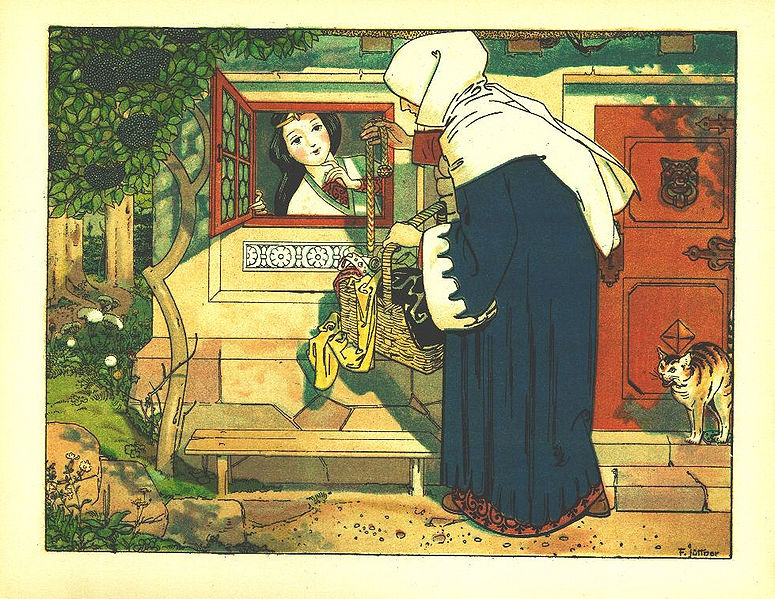If you don't follow me on facebook, you may not have seen my Friday article in The Federalist.
Here's a quote:
Correlation is not causation, but I wonder if, in a broad sense, the cultural message of pink princesses ultimately makes girls more receptive to stories in which traditional happy endings are impossible. Initially, many small girls really believe the princess story. They live and breathe it, plastic tiaras and all. What is this message that resonates with them? On a basic level, it is of course merely human to be attracted to youth, beauty, success, and happiness, as demonstrated by the friendly smile of the white-toothed heroine and opposed by the scowl of the witch. It is also the nature of a three-year-old to believe that she is not only special but also probably the center of the universe, that she should be served by admiring retainers, that she is the best at everything, and that she should win the prize in every competition. The princess fantasy lures little girls in with shiny rhinestones and simultaneously tells them everything that they already believe. In a sense it is developmentally appropriate. However, the job of adults is not merely to mirror children back to themselves. Our job is to help them mature and grow beyond the narcissism of babyhood.
It's interesting that discussion of little girls and princesses always seems to bring out strong feelings and lots of opinions. Another article ran in The Federalist today about how the author has made her peace with Disney princesses.
I am beginning to think that part of the disconnect we see in such discussions is centered around a confusion of what princesses represent. To feminists, they are merely oppressed and spineless women who require a man on a white horse. To anti-consumerists, they are merely plastic merchandise that generates a gazillion dollars. To psychologists, they are often an example of how we prime girls for body-image issues. To defenders of traditional femininity, they may be examples of good, old-fashioned romance and chivalry. To parents of small girls, they may be simply something that their children love.
I don't think that all of these people are talking about the same thing.
I love folk tales and tales of the fey. There are plenty of lovely, true, excellent stories in this genre about princesses. That is one kind of princess story. The movies of Disney are another. I like some of them in some ways (Tangled is hilarious). Yet the merchandise of Disney, in which all the characters lose their individuality and become products instead of characters, is not something that I want in my home. I'm just not going to buy my kid underwear that advertises for some company, ya know? I'm cranky like that.


I liked your article. I think people are so affected by the princess commercialism because they forget (or don't know) that they are eternal beings created in the image of God. Once 'born again' we have the power to become children of God whereby we cry out, Abba, Father.
ReplyDeleteWith authority (and according to the Bible) a woman may then declare, "I am a daughter of the King with complete access to the riches of the kingdom. I have authority to ask for whatever I want and I will not be denied any thing that is for my good. My Father knows what is best." She truly is a princess, just not the pink kind.
Yes, much of this desire to be a princess (as a child) or to be hot/sexy/desirable as an adult woman really does seem to come from a desire to be special (which is another way of saying that you want to know that you are valuable). If our value comes from God's love for us, it's a whole different paradigm.
DeleteAnna - I just read your article at the Federalist and then found my way to your blog - it was so very well said! It is such an interesting topic, and I loved your points on parents being the main influencers in their children's lives, not Disney. This line is great "The point of having one’s own children is to raise them. Don’t you want to be the one who shapes what they think it means to be beautiful, good, and happy?"
ReplyDeleteEven, if a girl doesn't completely get caught up with the Princess culture, the messages behind those movies and characters have seeped so far into our cultural mindset - follow your heart, there is a soulmate out there for you, etc....
Bethany, thanks! Ah, yes, the soulmate issue is another one that I hadn't thought of. Good point. Now that I think about it, I don't think that the old fairy tales like Snow White teach that concept as strongly as do the newer ones in which the romantic relationship between the protagonists is more developed, and more like the typical narrative of a modern romance novel. Interesting stuff to think about!
Delete